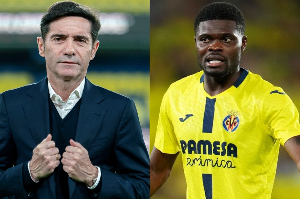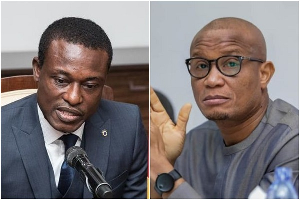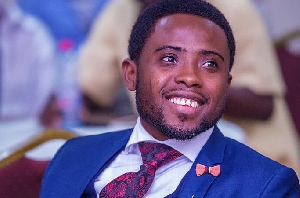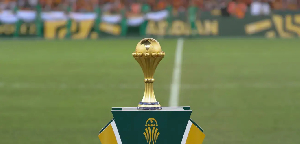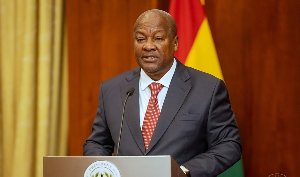General News of Saturday, 14 April 2018
Source: Munira Karim
The UNESCO/Guillermo Cano World Press Freedom prize
As part of the global Celebration of World Press Freedom Day, a prize of $25,000 US is be presented annually to an individual journalist, or organization, adjudged to have made an outstanding contribution towards the achievement of press freedom, in the past year. Here is a description of the Prize and its origins.
The “UNESCO/Guillermo Cano World Press Freedom Prize” has become a significant part of the global celebrations of the World Press Freedom Day (WPFD) since 1997. The prize is worth 25,000 USD and is presented to an organization or individual deemed by the judges to have made an outstanding contribution, amidst danger to the defence and promotion of press freedom anywhere in the world.
The award was instituted to commemorate the murder of Guillermo Cano Isaza, a Colombian journalist and editor of a daily newspaper, “El Espectator” in 1986. He was killed in front of his newspaper house in Bogata by two hit-men linked to a drugs cartel. His murder was suspected to be a reprisal for a campaign he had been waging against the influence of drug traffickers in Colombian politics. Three years after his murder, the newspaper house was also bombed. Four people who were linked to his murder were found guilty of conspiracy to murder and imprisoned in 1995. But three of the four killers had their sentences overturned on an appeal.
First presented 21 years ago, the award's winner is announced every year on May 3, as part of the global celebrations of the WPFD. The announcement is made at a Gala Dinner and Award night which is held in recognition of the handiwork and resilience of a journalist/organization whose determination and courage in fighting for freedom of expression, has achieved recognisable results.
The prize is conferred by the Director-General of the United Nations Educational, Scientific and Cultural Organization (UNESCO) on the individual or an organization chosen by a competent jury, after a selection process that lasts not more than two months maximum.
The jury consists of a six-member panel, one each from the UN Regions of Central Europe, Eastern Europe, Western Europe, the Pacific, Western Europe, Northern America and the Middle East (Arabic), together with an independent member.
Entries for the award are submitted by journalists and or organization working in the area of freedom of expression. Since the first award was made 21 years ago, the prize has been awarded to 21 journalists and activists across the globe, in some cases posthumously. Journalists from Syria, Mexico and China have won the award twice each.
The following are the persons who have won the award for their meritorious contribution to the defence and promotion of press freedom since the inception of the award:
GAO YU, a Deputy Editor in- Chief-of Economics Weekly, run by dissident intellectuals of China, who is also a free-lance journalist for several newspapers in China and Hong Kong, won the award in 1997 for her fight for press freedom and media independence in China. She was detained in 1989 following the Tiananmen protest and released 14 months later on health grounds. But she was again arrested on October 2, 1993, and sentenced in November 1994 to a term of six years imprisonment. Her crime? “Leaking state secrets”.
CHRISTINE ANYANWU was publisher and editor in chief of the national newsweekly The Sunday Magazine of Lagos, Nigeria, when she was arrested on May 31, 1995 because she had published articles reporting that there was no evidence to support an alleged plot to overthrow Nigeria's military regime of the time, headed by the late dictator, General Sani Abacha. After her arrest, she was condemned to life imprisonment by a special military tribunal in a trial held behind closed doors. She was awarded the UNESCO/Guillermo Cano prize in 1998.
JESUS BLANCORNELAS, a Mexican journalist, was adjudged the winner of the award in 1991. He had survived an assassination attempt on his life for his exposè on corruption and drug trafficking. The Editor-in-Chief of a newspaper published by the Committee for the Defence of Democratic Freedom (CDF) in Syria and a contributor to the Al-hurriya, NIZAR NAYYOUF, won the prize in 2000. He has been imprisoned since 1992 when he was sentenced to 10 years of forced labour for belonging to the banned CDF and for disseminating “false information”. During his incarceration, he was tortured and held in solitary confinement in the military prison of Mezze in Damascus.
U WIN TIN, a former editor of the daily Hanthawati newspaper in Myanmar; Vice Chair of Myanmar Writers Association and Founder of the National League for Democracy of Myanmar was adjudged the winner of the award in 2001. He was arrested in 1989 and accused of being a member of the Banned Communist Party of Myanmar and sentenced to 14 years imprisonment. He was later transported to Insein jail in Rangoon. In 1996, U Win Tin was tried in prison and sentenced to an additional five years for breaking prison regulations that prohibit the possession of writing materials.
AMIRA HASS, an Israeli journalist, won the award in the year 2003 for her resilience in exposing the plight and hardships that Palestinian citizens go through on a daily basis.
RAUL RIVERO, a Cuban journalist, won the award in 2004, followed by CHENG YIZHONG, a Chinese journalist, in 2005.
MAY CHIDIAC, a vocal Lebanese journalist, was the victim of a car bomb attack in September 2005 and had one of her hands and her left leg amputated. She won the prize in 2006.
ANNA POLITKORSKAYA, a Russian media activist, won the award posthumously in 2007. She was adjudged the winner for her “incredible courage and stubbornness” in chronicling events in Chechnya after the whole world had given up on the conflict.
LYDIA CACHO RIBEIRO, a Mexican investigative journalist and contributor to the daily newspaper, La Voz del Caribe, won the award in 2008 for her exposès of political corruption, organized crimes and domestic violence – all published, despite death threats.
The late journalist and editor of “Sunday Leader” newspaper in Sri Lanka, LASANTHA WICKREMATUNGE, won in 2009 and MONICA GONZALEZE MUJICA, a journalist from Chile, won in 2010 for her fight against dictatorship in Chile.
Others are the 2011 winner: AHMED ZEIDABADI, an imprisoned Iranian journalist and former Editor-in-Chief of “Azad” newspaper, and contributor to the Tehran-based daily, Hamshahari, the BBC Persian service, and the Persian/English news site, Rooz; and EYNULLA FATULLAYEZ, founder of the “Public Union of Human Rights”, a non-governmental organization in Azerbaijan (who was the 2012 laureate). He was imprisoned in 2007 for his activism in the struggle for freedom of expression and of the press. He was released in 2011 through a presidential pardon.
REEYOT ALEMU, an Ethiopian journalist, won in 2013 in recognition of her “exceptional courage, resistance and commitment to freedom of expression”; AHMET SIK, a journalist from Turkey, won in the year 2014 ; while the 2015 prize was won by MAZEN DARWISH, a lawyer and press freedom advocate who is president of the Syrian Centre for Media and Freedom of Expression (CMFE) and one of the founders of The Voice newspaper and syriaview.net, an independent news site banned by the Syrian authorities. He has been detained since he was arrested in February 2012, together with two colleagues – Hani Al-Zitani and Hussein Ghareer.
KHADIJA ISMAYILOVA, an Azerbaijanian freelance journalist and contributor to the Azerbaijani service of Radio Free Europe, was detained in December 2014, and in September 2015, was sentenced to seven and a half years’ imprisonment on charges alleging abuse of power and tax evasion. She won the prize in 2016 and DAWIT ISAAK, an Eritrean-Swedish journalist who was imprisoned in a crackdown on the media that occurred in Eritrea in September 2001, won the prize in 2017. The last time he was heard from was in 2005.
This year's award ceremony will be held in Accra on May 2, at the opening ceremony of the WPFD global celebration to be hosted by Ghana. The President of the Republic of Ghana, H.E Nana Addo Dankwa Akufo-Addo, will be the Guest of Honour and the Director-General of UNESCO, Audrey Azouley, will present the award to the winner.
The celebration closes on May 3, with a myriad of sessions and academic conferences.
Source: Munira Karim
The writer is a staff of the Ministry of Information


